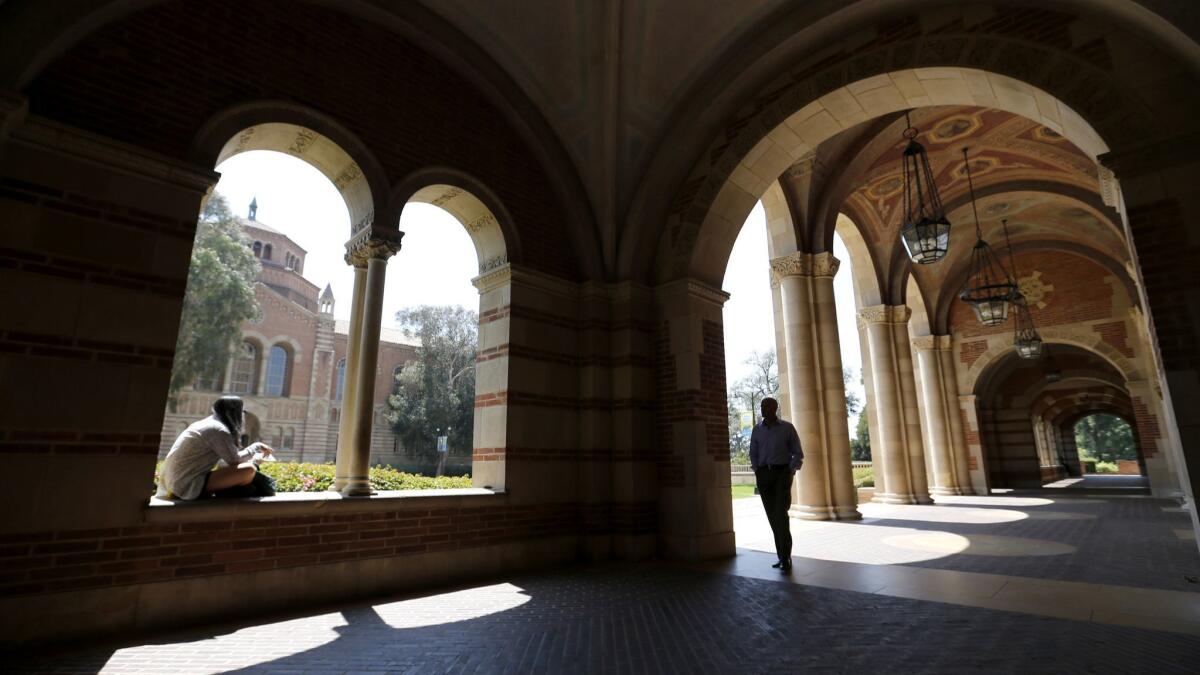A lingering question in the college admissions scandal: Why?

- Share via
A college admissions scandal caught actresses Felicity Huffman and Lori Loughlin, a fashion designer, lawyers, CEOs and other wealthy families in an elaborate scheme to pay top dollar to ensure their kids got into elite universities.
William “Rick” Singer, who ran a for-profit college admissions company in Newport Beach, promised parents a “side door” to get into some of the nation’s most selective schools, according to prosecutors. Singer pleaded guilty this week, admitting he masterminded a criminal operation dating back at least a decade.
He orchestrated a sham charity to funnel donations from rich parents to exam proctors, admissions officials and coaches at UCLA, Yale, USC, and other top schools, padding his own pockets in the process, authorities said.
According to federal prosecutors, parents paid anywhere from tens of thousands to millions of dollars to ensure their offspring got accepted to schools they probably weren’t qualified to attend.
READ MORE: Here’s everyone involved in the college admissions scandal »
One of the big questions: Why?
“There is such pressure around students and parents around college admissions,” said Robert Franek, the editor-in-chief of the Princeton Review. “People are hung up on perception and brand.”
That applies to all families with college-bound students. But for rich families in particular, sending a child to an elite university is “the ultimate status symbol,” said Greg Kaplan. He’s the author of “Earning Admission: Real Strategies for Getting Into Highly Selective Colleges” as well as a private college counselor and admissions strategist who also operates out of Newport Beach.
Ultrawealthy families can spend millions to put their names on libraries or endow department chairs — the kind of “wink, wink” to admissions officers that signals there could be more where that came from if an underachieving offspring gets a spot in the freshman class. When the scandal broke, it renewed the focus on Charles Kushner’s $2.5-million pledge to Harvard shortly before the future First Daughter’s husband, Jared Kushner, was admitted.
But for some families, Kaplan said, that’s not good enough: They want it to seem like a legitimate acceptance based on merit, reflecting on how excellent their parenting must have been.
“If your last name is on a building, you can’t say that with a straight face,” he said.
It’s the ultimate status symbol.
— Greg Kaplan, author
David Reynaldo founded the private college counseling company called CollegeZoom based in Santa Monica. He said that in his experience, wealthy people may use money to try to make up for shortcomings in their parenting.
“You may not have a kid who was raised with your work ethic, your values, who can carry on your legacy as you may idealize yourself to be. So what drives them to pay for their kids to be successful is a fear,” Reynaldo said. “They don’t want their kid to be a millennial who mooches off them, who lives in their garage, who lives in their shadow, who is lazy because they come from a life of wealth and privilege.”
To some wealthy parents, he said, college is viewed “more as a social club.” They want their child to go to Yale or UCLA because they want their child to be surrounded by the kind of smart go-getters who deserve to be at those schools, in hopes it will rub off on their less-than-dazzling offspring.
There are plenty of legal ways to spend money to try to give your kids an edge in the college admissions process: Test prep classes and tutors. Hiring private admissions counselors and essay coaches for hundreds or thousands of dollars. Private sports coaches to help them make varsity. Involvement in costly sports such as lacrosse, golf or crew.
Admissions officials look at grades and test scores, as well as essays and other application answers, to try to tease out intangible qualities: Grit. Perseverance. Passion.
In bypassing that process, parents are denying their children an opportunity to grow, said Jill Margaret Shulman, a college essay coach based in Amherst, Mass. and author of the forthcoming book “College Admissions Cracked: Saving Your Kid (and Yourself) from the Madness.”
“They stole these kids’ agency to make their first big decision in their young lives,” Shulman said. “They took away any chance for these kids to feel great about themselves for getting into college, or to grow from a denial.”
For many parents — not just wealthy ones — getting your kid into a good college can feel like the last major parenting decision you can make. Shulman said parents “think that if they can just get their kid into the right college, it will catapult them to success and set them up in a way that the kids can do OK on their own without them.”
Shulman said she can empathize with the impulse, but said the lengths these parents went to was repulsive. Most of all, she said, she felt bad for the kids — the ones who could have gotten into those schools but didn’t, and the ones whose parents were caught up in the scheme.
Those children of wealthy parents, she said, now have to deal with the extremely public embarrassment of learning they don’t deserve to be where they are, on top of knowing that even their parents didn’t believe they could get in on their own.
“Rich kids deserve parents who believe in them, too,” Shulman said.
Follow me on Twitter @jessica_roy.
More to Read
Sign up for Essential California
The most important California stories and recommendations in your inbox every morning.
You may occasionally receive promotional content from the Los Angeles Times.











